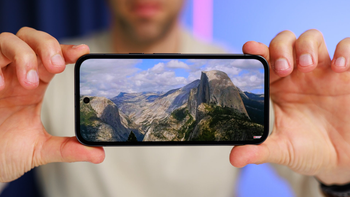Epic Games sues Apple over anti-competitive restraints and monopolistic practices

It looks like the war between Apple and Epic Games is on. The latter provoked the Cupertino-based company earlier today by launching its own purchase system for Fortnite on the App Store. Consequently, Apple removed Fortnite from the App Store for violating its rules and guidelines.
In an official statement released today, Apple claims that the reason for removing Fortnite from the App Store is the fact that Epic Games failed to submit the latest update through Apple's reviewing system.
Anyway, that seems to have been the straw that broke the camel's back, as Epic Games has just announced that it filed a civil antitrust lawsuit against Apple for “anti-competitive restraints and monopolistic practices.”
The main focus of Epic Games' action is the App Store's strict policies that Apple forces developers and publishers to follow if they want their products to be brought to larger audiences. The way Epic Games' action is written suggests that the company is determined to force Apple to make a change when it comes to App Store rules.
It's important to add that Epic Games isn't seeking any monetary compensation from Apple. Instead, the company claims that it's just looking for a favorable decision from the Court that will allow fair competition in the iOS app distribution and in-app payment processing markets.
Epic Games goes on to say that while Apple initially promised users that “there's an app for that,” it opened up iOS and invited third-party app developers to published their products for the iOS ecosystem. It's these apps that now elevate the iOS ecosystem and offer the primary marketing features for iPhones and iPads, Epic Games claims.
Sadly, Apple imposes “unreasonable restraints and unlawfully maintains a monopoly in the iOS app distribution market.” More importantly, Apple doesn't allow iOS users to download apps from outside the App Store and forces developers to accept its storefront's rules if they want to have their apps listed.
The 30% fee Apple charges for every iOS user's app purchase is largely addressed in the lawsuit as well. It highlights the fact that developers have no choice but to abide by Apple's policies or simply not have their apps published in the App Store.
Epic Games' lawsuit addresses all the complaints many other companies and users have had about the App Store, and it certainly looks like it was prepared long before. The moment Epic Games decided to get around Apple's 30% fee, it probably knew that Fortnite would be removed from the App Store. It's hard to tell if Epic Games will be able to win the suit against Apple, but it certainly has the money to sustain the action for many years to come. The full civil antitrust case filed by Epic Games against Apple is available to read online.
In an official statement released today, Apple claims that the reason for removing Fortnite from the App Store is the fact that Epic Games failed to submit the latest update through Apple's reviewing system.
The main focus of Epic Games' action is the App Store's strict policies that Apple forces developers and publishers to follow if they want their products to be brought to larger audiences. The way Epic Games' action is written suggests that the company is determined to force Apple to make a change when it comes to App Store rules.
This case concerns Apple’s use of a series of anti-competitive restraints and monopolistic practices in markets for the distribution of software applications to users of mobile computing devices like smartphones and tablets and the processing of consumers’ payments for digital content used within iOS mobile apps. Apple imposes unreasonable and unlawful restraints to completely monopolize both markets and prevent software developers from reaching the over one billion users of its mobile devices (e.g., iPhone and iPad) unless they go through a single store controlled by Apple, the App Store, where Apple exacts an oppressive 30% tax on the sale of every app. Apple also requires software developers who wish to sell digital in-app content to those consumers to use a single payment processing option offered by Apple, In-App Purchase, which likewise carries a 30% tax.
It's important to add that Epic Games isn't seeking any monetary compensation from Apple. Instead, the company claims that it's just looking for a favorable decision from the Court that will allow fair competition in the iOS app distribution and in-app payment processing markets.
Sadly, Apple imposes “unreasonable restraints and unlawfully maintains a monopoly in the iOS app distribution market.” More importantly, Apple doesn't allow iOS users to download apps from outside the App Store and forces developers to accept its storefront's rules if they want to have their apps listed.
The fee Apple collects for every app purchase is cited too
The 30% fee Apple charges for every iOS user's app purchase is largely addressed in the lawsuit as well. It highlights the fact that developers have no choice but to abide by Apple's policies or simply not have their apps published in the App Store.
For example, as the sole distributor of iOS apps, Apple collects the money from every iOS user’s app purchase, remits only 70% of that payment to the app developer, and retains a 30% tax for itself. iOS developers are thus forced to increase the prices they charge consumers in order to pay Apple’s app tax. There is no method app developers can use to avoid this tax, as Apple has foreclosed any alternative ways to reach the over one billion users of iOS devices.
Epic Games' lawsuit addresses all the complaints many other companies and users have had about the App Store, and it certainly looks like it was prepared long before. The moment Epic Games decided to get around Apple's 30% fee, it probably knew that Fortnite would be removed from the App Store. It's hard to tell if Epic Games will be able to win the suit against Apple, but it certainly has the money to sustain the action for many years to come. The full civil antitrust case filed by Epic Games against Apple is available to read online.













Things that are NOT allowed:
To help keep our community safe and free from spam, we apply temporary limits to newly created accounts: